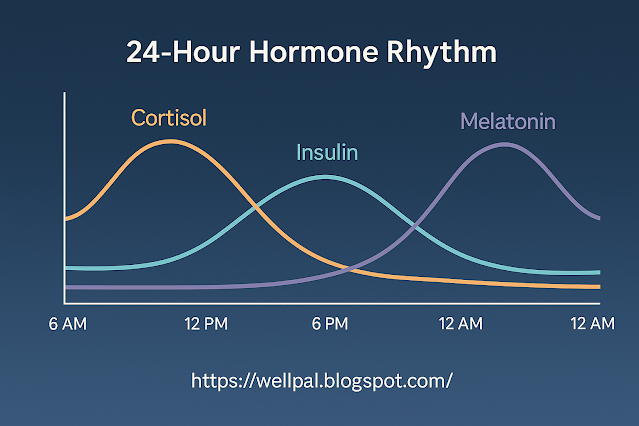- Get link
- X
- Other Apps
- Get link
- X
- Other Apps
BioSyncing Series - 7
⚡ TL;DR
Your hormones operate on a 24-hour rhythm.
Aligning your lifestyle with hormone timing boosts energy, metabolism, and mental clarity.
Mistiming meals, workouts, or light exposure can lead to fatigue and imbalance.
🧪 Self-Check: Is Your Hormonal Clock Misaligned?
🧠 Expert Dialogue: “When You Do Things Matters—Not Just What You Do”
Emma (Overwhelmed Entrepreneur): “I’ve started eating cleaner and exercising more, but I still feel tired and anxious.”
Dr. Javier Lin (Chronobiologist): “That’s a great start. But timing is the missing piece. Are you eating breakfast at sunrise or working out at 10 PM?”
Emma: “More like skipping breakfast and hitting the gym after Netflix at midnight.”
Dr. Lin: “Your hormones are out of sync. Cortisol should peak in the morning to fuel focus. Melatonin rises at night to initiate sleep. Late meals or intense workouts after sunset confuse your internal clock.”
Emma: “So it’s not just about healthy habits, but when I do them?”
Dr. Lin: “Exactly. Time your habits right, and your hormones will work with you—not against you.”
Alt text: Infographic of daily hormone timeline with cortisol, insulin, and melatonin waves labeled. Alt: "24-hour hormone rhythm chart — blog: https://wellpal.blogspot.com/"
🔬 The Science of Hormone Timing
1. Morning Cortisol Surge
Cortisol naturally peaks around 6–8 AM to help you wake up and focus. Missing natural light in the morning or skipping breakfast can dull this surge.
2. Midday Metabolic Efficiency
Insulin sensitivity and digestive strength are highest between 10 AM and 2 PM. This is the best window for your largest meal.
3. Evening Melatonin Rise
Exposure to blue light after sunset delays melatonin release, affecting sleep and downstream hormonal cycles.
Scientific References:
Cell Reports (2018): Hormonal rhythms follow circadian cycles that adapt to light and behavior.
Journal of Clinical Endocrinology (2020): Late-night exercise disrupts cortisol and melatonin cycles.
Nature Communications (2021): Timing meals during daylight hours improves glucose control.
Alt text: Photo of morning light exposure with a woman stretching by the window. Alt: "Natural morning light resets cortisol rhythm — blog: https://wellpal.blogspot.com/"
✨ Experience Story: From Fog to Flow
I used to rely on 2 PM lattes and 11 PM brainstorming. I believed I was a night owl—until burnout hit. I learned about cortisol curves, swapped my phone scrolling for morning walks, and started eating lunch by noon. Within weeks, my sleep deepened, cravings vanished, and my creativity flowed by 10 AM.
This shift wasn’t about doing more. It was about syncing my actions with biology.
Alt text: Graphic comparing two lifestyles: synced vs. unsynced habits. Alt: "Synced habits support hormonal health — blog: https://wellpal.blogspot.com/"
📊 Quick Poll – When Do You Feel Most Energized?
📈 Poll Results:
❓ FAQ – Hormone Timing Explained
Q1: Is hormone timing only important for women?
No. While cycles differ, both men and women benefit from syncing with circadian hormonal rhythms.
Q2: Does eating late really affect hormones?
Yes. It delays melatonin and interferes with insulin, raising the risk of poor sleep and weight gain.
Q3: What about shift workers?
They face unique challenges but can still benefit from consistent schedules, light therapy, and strategic meals.
Q4: Can supplements help reset hormones?
Vitamin D in the morning and magnesium at night may support better alignment, but timing and light are primary.
Q5: How long does it take to reset my hormonal rhythm?
Some people feel better in days; for others, it may take a few weeks of consistency.
🧭 Navigation
🌱 Call to Action: Align for Energy
Hormonal harmony isn’t a mystery—it’s a rhythm waiting to be restored. Start with one change: wake up with the sun, move in the morning, and eat dinner before the stars appear. 🕒
You don’t need more willpower. Just better timing.
Read more insights and tips on Tistory and sync your health with your biology.
Explore 14 curated wellness blog series to nourish your mind and body—all in one place.
💚 Thank you for reading!
We hope this post helped you feel more informed, supported, and inspired.
Stay well and come back anytime.
biohacking hormones
Circadian Rhythm
cortisol rhythm
energy optimization
hormonal balance
hormone health
Hormone Timing
melatonin cycle
metabolic health
stress resilience
- Get link
- X
- Other Apps




Comments
Post a Comment